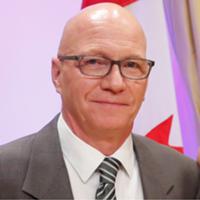Athabasca University is Canada's largest online post-secondary institution, connecting its 41,000 students from around the world to academics who live all over Canada. Its networked approach is key to its success and is the way of the future, in the view of Peter Scott, the school's new president.
But Jason Kenney's Alberta government has been pressing the university, publicly and behind the scenes, to shift from a nearly entirely virtual campus by locating more of its professors and staff in the northern Alberta town.
It is not clear what it would take for the online university to get people to move their homes and lives 150 kilometres north of Edmonton to a town of 3,000 in a region where the forestry industry is the largest employer.
Now, after rising tensions, Scott has drawn a sharp line in the sand, flatly telling The Tyee in an interview, “We will have a virtual campus.
“And our strategy to deliver the virtual workforce, to make the virtual campus work, has also been agreed to in a longstanding way.”
The Tyee has obtained a March 22 letter from Advanced Education Minister Demetrios Nicolaides to Athabasca University board chair Nancy Laird giving instructions on how it should operate.
In it, Nicolaides said the school’s plan “has created significant concerns with the local community” that it may reduce or close its physical spaces in Athabasca, or favour remote hires over on-site employees.
“As you know, I strongly support the University’s vision to reposition itself as a leader in online learning in Canada but at the same time, I share many of the concerns expressed by local community members,” Nicolaides wrote, adding he has met “extensively” with Athabasca Mayor Robert Balay and other town leaders about the issue.
In the letter, the minister directed the university to:
- Consolidate executive and senior administration offices in Athabasca “at the earliest opportunity”;
- Develop and implement, by June 30, a strategy to attract and retain talent and “grow a broad range of employees in Athabasca”;
- Develop and implement a reopening strategy for the Athabasca campus that would resume most employees working on-site and allow public access to services.
Nicolaides also said the government will provide dedicated seats on the university’s board of governors for local representatives and “clearly establish the Town of Athabasca as the institution’s headquarters.”
The letter from Nicolaides followed a year-long campaign by a group of townspeople who want the university to hire or move more people to Athabasca. The campaign included the hiring of lobbyist Hal Danchilla, who was co-chair of Kenney’s election campaign, at a cost of $7,750 a month. The town is providing the money to pay Danchilla.
The standoff between Nicolaides and Athabasca University exemplifies a growing rift between universities and the government of Premier Jason Kenney over autonomy.
Alex Usher is a consultant and expert in university governance. He said it is not unusual or improper for a provincial government to dictate how a university operates, given they fund them with millions of dollars of public money.
But he said if Nicolaides is suddenly reneging on an established plan to shift the university’s operations almost entirely online, “what you have here is a story of a government flip-flopping for the purpose of short-term political expediency.”
‘It is the board that runs university strategies, not governments’
Scott is a British academic and senior university executive who was recruited from Australia and moved to the Edmonton area in early January. He told The Tyee he does not view the Nicolaides letter as a “directive,” but rather a request — one he will not abide to.
“I am trying to clarify exactly what the minister thinks he is asking us to do, because we have an agreed mission, coming from our mandate, which he has agreed [to],” Scott said. “And he is also on the record as being someone who wishes to lift red tape, and not being someone who wishes to increase red tape. He is on the record as being someone who will not micromanage universities.”
Scott said he met with Nicolaides in January and discussed the university’s near virtual plan and there was no mention of changing that mandate.
“It is the board that runs university strategies, not governments,” he said. “So I'm very happy to respond to what the minister has framed up, in the letter to us, as his requests. But that must be in line with our continued mission.
“It is my job to act for the benefit of the university, as the board mission requires that they act in the best interest of the university.”
Nicolaides was unavailable for an interview Thursday. In a statement, he said, “the mandate of post-secondary institutions is set by the Government of Alberta and it is the duty of the board of governors to execute said mandate and direction.
“We have given clear direction to the board of governors and expect to see their report on how they will execute the directives given to them by the Government of Alberta by the deadline of June 30.”
Premier references government directives at town hall
On March 24, Nicolaides and Premier Jason Kenney attended a March 24 town hall in Athabasca about the university’s future. A video of the town hall was posted online. Neither Scott nor any members of the board were invited.
Kenney told the crowd about “a debate and some tension” in recent years about the physical presence of the school, which he said has a “compelling vision to be Canada’s online university.”
“Some have said, ‘Well, now that we're in the internet world, there really are no bricks-and-mortar institutions and everything is virtual,’” Kenney said. “‘And if this is going to be an online university, then we should abandon the idea that it is located in any one particular place. It exists on the internet, it is a virtual university.’
“But at the end of the day, as I have been saying to my colleagues, ‘No, a university, a post-secondary institution is a community and it needs a heart. It needs to be able to have a culture, and you can't replicate that virtually, online,’” Kenney continued.
The premier referenced apparent concerns from residents who say the university’s ties to the community are shrinking.
“So we are here today to address that and to resolve that, and let me just say this: we believe that Athabasca University must be rooted in this community for its long-term future,” Kenney said to applause.
During a question-and-answer period, someone who appeared to be a university employee said staff are frustrated with wasteful spending at the school, and alleged administrators don’t care about the town campus.
“That is exactly why we are here,” Kenney replied. “That is exactly the direction we have given the board.
“Now, how exactly they apply that in terms of what detail, exactly what positions and budget decisions is up to them, because the job of the minister of [advanced] education is not to micromanage” post-secondary institutions, Kenney said.
“We have boards with governance authority under the law,” the premier continued, “but he has given clear direction on the issues that you have just raised. That is why we are here. We have heard you loud and clear.”
Scott, however, said the university will use that governance authority to continue its shift online. And he said he has no intention of moving to Athabasca.
“If anyone wants to turn the clock back 30 years, it won't be us,” Scott said. “The future of this university, the future of education, is to turn the clock forward.
“And I look forward to working with an engaged government on how we turn the clock forward.” ![]()


















Tyee Commenting Guidelines
Comments that violate guidelines risk being deleted, and violations may result in a temporary or permanent user ban. Maintain the spirit of good conversation to stay in the discussion.
*Please note The Tyee is not a forum for spreading misinformation about COVID-19, denying its existence or minimizing its risk to public health.
Do:
Do not: